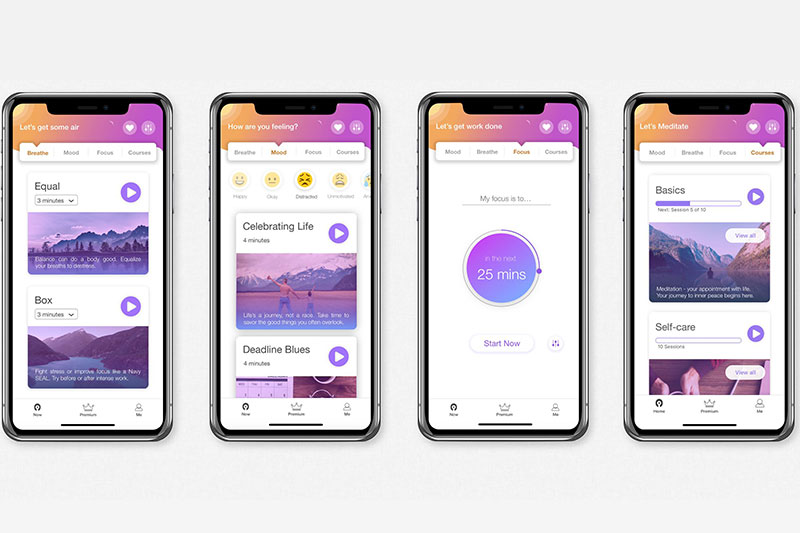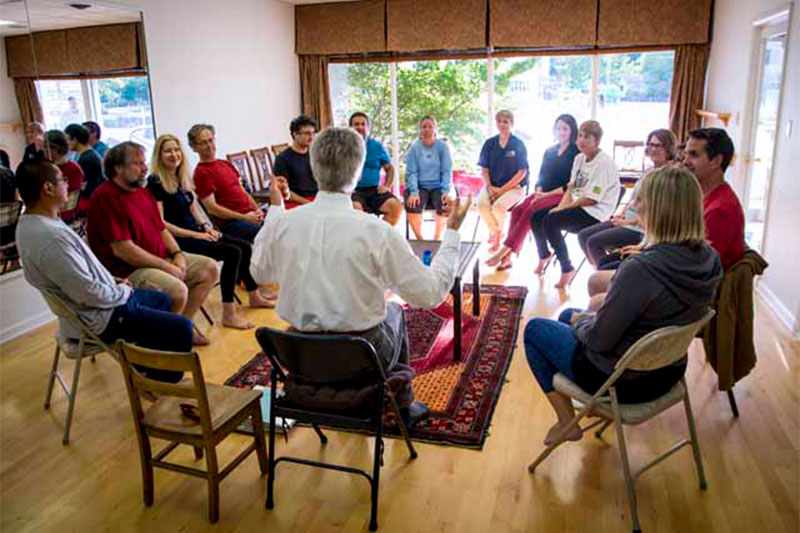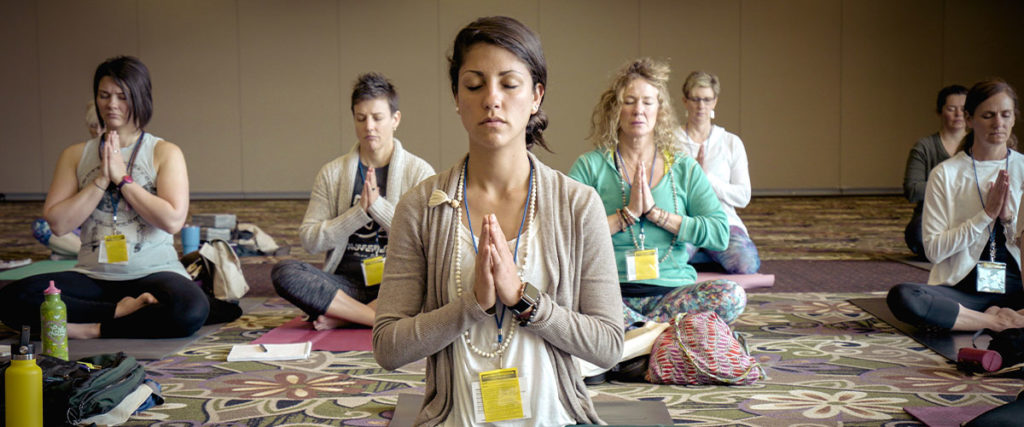Serial entrepreneur Bjorn Lee pioneered MindFi, an ‘eyes open’ meditation app, after he encountered stress-induced health problems. Now, he’s helping others improve their mental and physical health.
Eight years ago, 30-year-old Silicon Valley entrepreneur Bjorn Lee found his life on the line. “I started having sharp, momentary chest pains. At one point, I thought I was having a heart attack,” he says. He was diagnosed with stress-induced pain. “Turns out, whenever I was working, I was so stressed out, I wasn’t breathing enough,” he explains. Following his doctor’s advice, he dived into meditation as part of his treatment, flying to Northern India where he practised vipassana meditation in a 10-day silent retreat. The experience was life-changing. Now a convert to meditation and one of Asia’s foremost advocates of mindfulness, Bjorn wants to change others’ lives too. Here, he tells Hive Life how he intends to help us regain a balance in our hectic work lives with his smart meditation app MindFi and his ‘eyes open’ meditation.

“I was resistant to meditation at first,” begins Bjorn, speaking of his love-hate relationship with the art of zen. Like many in Asia, he grew up thinking meditation was a boring, woo-woo thing. “When I was 10-years-old, I really didn’t think it was cool at all,” he laughs. As a central practice of Buddhism, meditation is often assumed to be religious, not least in Asia. However, as the world has woken up to its benefits – an ongoing Harvard study has suggested that a regular meditation practice can help change how our brain responds to stress – so, too, have people like Bjorn.
This is no doubt good news for the stressed-out communities of Asia. “We are way more stressed than the West,” says Bjorn, who used to wake up at 4 am to work when he was at customer service software company Zendesk in Singapore. “If you look at the top economic performers in the region such as China, Japan, and Hong Kong where we’ve seen exponential growth, people are putting themselves under immense pressure.” Burnout is even more pronounced in Singapore, where Bjorn was born and raised. According to a March 2019 survey conducted by health service company Cigna, nearly 92% of Singaporeans surveyed were stressed from work, making them one of the most stressed groups in the world. And of this group, 13% reported that the stress they faced was unmanageable.
You might also like Wintercearig: Tackling Mental Health Issues in Vietnam

Traditional meditation retreats are now regularly touted as a panacea for work-related mental health issues. But, here’s the catch: they may be helpful, but they’re not sustainable. “If you fly far to go to a retreat, then that inner state of peace will only exist in that far away wonderland. Once you return to your normal life, you’ll have so many things to do that you will not get into that meditative state you had in Bali, or India, or some beautiful, amazing place,” says Bjorn. “Medication sounds really simple – you just need to sit down and close your eyes – but it is very difficult to implement in our hectic working lives.”
It was a pain point Bjorn noticed after his trip to Northern India. “Once I came back, I stopped meditating, because I felt that the user experience was broken,” he recalls. “What we really need in today’s busy world is something that’s easier to integrate into your daily life.” In 2017, alongside other mindfulness apps such as Headspace, Calm and 10% Happier, Bjorn’s wellness startup MindFi was born out of this need to “cultivate that inner state of peace in their native, natural, everyday environment.” Helping himself and other high-achievers in Asia, he explains, “we want to remind our audience to be mindful in our daily lives.”
MindFi’s app, designed in partnership with psychiatrists, medical psychologists, and neuroscientists, is built on the same premise. Focusing on short meditations, the subscription-based app offers unlimited access to a range of 3-5 minute guided meditation exercises for HKD 48 (USD 6) per month. In addition, the app measures your stress and sleep levels. But, what marks it out from other similar products on the market, is its advocacy of ‘eyes open’ meditation. “We have a 24/7 holistic approach to mindfulness. Essentially, you can pick up mediation based on the activities you do, or the mood you’re feeling right now. Most importantly, you can meditate at any time of your day with your eyes open,” Bjorn explains.

The theory on which MindFi’s open-eye meditation program based is “mindfulness-based stress reduction (MBSR)” – a well-researched meditation approach developed by MIT alumnus Professor Jon Kabat-Zinn which is used in hospitals, nursing homes, schools and workplaces around the world to treat pain and depression. The word ‘mindfulness’ is the key. As Bjorn explains, “mindfulness is one type of meditation. It’s about paying attention to the present moment in a purposeful and non-judgemental manner.”
And the concept is not as far-fetched as it seems. “When you pay attention to your breath at this instant, you’re not thinking about anything else. You only focus on the present things that are happening,” Bjorn elaborates. He proposes that this mindful practice can also be applied to other daily activities, from drinking water to walking to riding a bus home from work, and his app is there to help. MindFi’s meditation sessions enable users to meditate anywhere, anytime, by guiding users’ attention to details they’ve often ignored – everything from the colour of the sky to the temperature of the water they’re drinking. Bjorn explains, “This is the first step for busy people who are always being distracted to start learning about meditation and integrate it into their busy schedules.”
Bjorn’s open-eye meditation concept may be novel in the multi-billion wellness industry where established mindfulness apps like Headspace and Calm have already claimed huge ground, but it does not lack followers. Today, “tens of thousands of users are checking in to MindFi every day. Users of other popular apps have come to us because our curriculum is more practical and more relevant to their daily life,” Bjorn says proudly. MindFi’s popularity reflects a growing consciousness around mental wellness and widespread interest in meditation as a better solution to stress relief in an era of non-stop information and rising pressures.

What drives meditation to the fore of the mental wellness conversation is the wellness industry’s effort to redesign the age-old Buddhist practice into an accessible alternative to exorbitantly-priced retreats and self-help gurus. “Meditation is not that new, but it has been packaged into a nicer experience for a society that’s addicted to their smartphones. It’s been packaged into something more relevant to our medium today.”
For Bjorn, meditation is more than just a passing trend. “20-30 years ago, physical fitness, too, was a trend. Then gyms started appearing suddenly, starting in California, and now they’re everywhere. They are ingrained in us now. We see the same happening with meditation.” Next, Bjorn wants to turn MindFi into an AI-based life coach for the mind, with his team working on “a recommendation algorithm that will contextualise these exercises for your daily life,” using data about your daily habits. “Mental fitness exercises should be available for everyone. Mental healthcare isn’t just for ‘crazy people.’ I believe that we’re slowly losing that stigma, and realising that everybody can improve their mental health.”
Related Articles
Digital Detox Asia: How to Master Your Phone Before It Masters You





